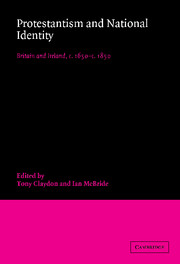Book contents
- Frontmatter
- Contents
- List of contributors
- Acknowledgements
- List of abbreviations
- Introduction
- England
- Britain and Ireland
- Britain, Ireland and the world
- 11 The island race: Captain Cook, protestant evangelicalism and the construction of English national identity, 1760–1800
- 12 A transatlantic perspective: protestantism and national identities in mid-nineteenth-century Britain and the United States
- Index
12 - A transatlantic perspective: protestantism and national identities in mid-nineteenth-century Britain and the United States
Published online by Cambridge University Press: 16 October 2009
- Frontmatter
- Contents
- List of contributors
- Acknowledgements
- List of abbreviations
- Introduction
- England
- Britain and Ireland
- Britain, Ireland and the world
- 11 The island race: Captain Cook, protestant evangelicalism and the construction of English national identity, 1760–1800
- 12 A transatlantic perspective: protestantism and national identities in mid-nineteenth-century Britain and the United States
- Index
Summary
In the history of protestantism and national identities, the period between the beginnings of legislative toleration of Roman Catholicism in the late 1770s, and its substantial achievement in 1829, has an evident unity. Despite their many differences of interpretation, both Linda Colley and J. C. D. Clark push their analysis of the influence of protestantism in eighteenth-century Britain on into the first third of the nineteenth century, and then conclude it in the 1830s. Both see the enactment of emancipation as a profoundly significant event, even if Clark interprets it primarily as a cause of change, and Colley primarily as a consequence of changes that had already been taking place over the preceding decades. Colley in particular recognises that strong protestantism was conspicuous in Britain for many decades after 1829, but ‘none the less’, she concludes, ‘1829 was the end of an era’.
This chapter, however, is concerned with the period after 1829 and explores the mechanisms and the contexts in which the cultural and ideological frameworks analysed in earlier chapters survived beyond 1829. There is also consideration of the ways in which they were replicated across the Atlantic, in the north-eastern United States. The intention is not to dispute the essential judgement that 1829 was a watershed. Catholic emancipation was profoundly significant in that it left the composite British state no longer defined by its exclusion of Roman Catholicism; and because it meant that protestantism, at least in the negative sense of the word, had ceased to be a matter of national consensus.
- Type
- Chapter
- Information
- Protestantism and National IdentityBritain and Ireland, c.1650–c.1850, pp. 291 - 310Publisher: Cambridge University PressPrint publication year: 1998
- 3
- Cited by



